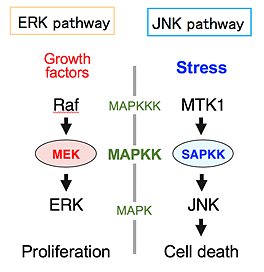Spatio-temporal dynamics of SAPKK regulates cell fate decisions under stress conditions

Date
Location
Description
Dear All,
Cell Signal Unit (Yamamoto Unit) would like to inform you of a seminar by Dr. Mutsuhiro Takekawa from Institute of Medical Science, The University of Tokyo.
-----------------------------------------------------------
Date: Wednesday, January 16, 2019
Time: 13:00-14:00
Venue: C015, Level C, Lab 1
-----------------------------------------------------------
Speaker:
Dr. Mutsuhiro Takekawa, Institute of Medical Science, The University of Tokyo.
Abstract:
Sequential activation of three protein kinases (MAPKKK-MAPKK-MAPK) within MAPK cascades is an evolutionary-conserved mechanism of intracellular signaling among eukaryotes. In mammalian cells, at least three functionally distinct subfamilies of MAPKs are present, namely, ERK, JNK, and p38. While the classical ERK MAPK is predominantly activated by growth factors, two relatively newly identified MAPKs, p38 and JNK, are preferentially activated by various environmental stresses (e.g., ultraviolet-light and g irradiation, oxidative stress, DNA-damaging reagents, osmotic stress, and pro-inflammatory cytokines). Therefore, p38 and JNK MAPKs are collectively referred to as stress-activated protein kinases (SAPKs). Each of these MAPK cascades can regulate several different biological functions. In general, the ERK pathway mediates growth-promoting and anti-apoptotic signaling, while the p38 and JNK pathways play crucial roles in cellular stress responses such as growth arrest and apoptosis. In addition, the p38 and JNK pathways are involved in inflammatory responses. Dysregulation of these critical signal transduction systems is involved in the etiology of various life-threatening diseases, including cancer, autoimmune diseases, and neurodegenerative disorders. Therefore, these signaling systems are of clinical importance. Recent advances in the fields of molecular-imaging technology and mathematical science have not only made it possible to identify spatio-temporal dynamics of signaling molecules that participate in the MAPK pathways, but have also provided new insights into the basic principles underlying the regulation of MAPK signaling and the resulting biological outcomes. In this seminar, I will introduce our recent findings regarding the MAPK signaling pathways, with particular emphasis on spatio-temporal regulation of SAPKK and its role in cellular stress responses.
Host:
Prof. Tadashi Yamamoto
We hope to see many of you at the seminar.
Best regards,
Yuki Nakagawa
Research Unit Administrator
Cell Signal Unit
Subscribe to the OIST Calendar: Right-click to download, then open in your calendar application.



